
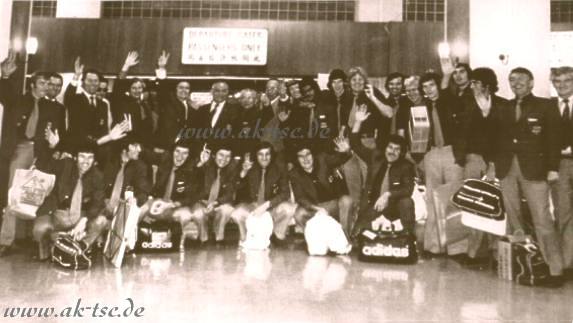
The Australian Socceroos arrived on Sydney Mascot Airport at 12:30pm on 15 November 1973
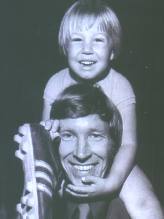 Jimmy
Mackay held up the right boot that did it, and said: "This is for my little
boy....this is for kids all over Australia." Jimmy's little boy, his three-year-old
son Malcolm, was sitting on his old man's shoulders hanging on to the size seven that
rocketed Australia into the World Cup Soccer finals in Munich.
Jimmy
Mackay held up the right boot that did it, and said: "This is for my little
boy....this is for kids all over Australia." Jimmy's little boy, his three-year-old
son Malcolm, was sitting on his old man's shoulders hanging on to the size seven that
rocketed Australia into the World Cup Soccer finals in Munich.
"They should put that boot into a museum," said a fan, "that's a piece of
Australian history now, that is." But Jimmy Mackay said no, it wasn't going in any
museum and no, he wasn't selling it either. I saw one bloke offer him $100 for it. "I
want my little boy to keep it. You see, everybody is happy with what this Australian team
has done. But those who are going to appreciate it best are little boys like Malcolm -
kids all over the country. They are the ones who can look at the Australian Soccer team
with pride now, and tell their dads they want to pay the game," Jimmy said.
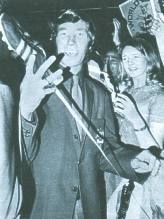 In
the noisiest, happiest, and most emotional welcome home I've ever seen for any of our
sportsmen, Australia's Socceroos returned from Hong Kong to a tumultuous reception
yesterday afternoon at Sydney airport. They were all heroes. Not just Jimmy Mackay - the
man who gunned that sensation 30 metres goal against South Korea to take us to Munich.
That was a real fight-back, a real team-effort to come back from two goals down in Seoul
to equalise, then go to Hong Kong and take out the play-off.
In
the noisiest, happiest, and most emotional welcome home I've ever seen for any of our
sportsmen, Australia's Socceroos returned from Hong Kong to a tumultuous reception
yesterday afternoon at Sydney airport. They were all heroes. Not just Jimmy Mackay - the
man who gunned that sensation 30 metres goal against South Korea to take us to Munich.
That was a real fight-back, a real team-effort to come back from two goals down in Seoul
to equalise, then go to Hong Kong and take out the play-off.
"I still can't believe it," said Jimmy, over the din of the brass band, the
cheering and the shouting, and the woman dressed as a kangaroo jumping around the terminal
in front of us. "In a few week's time, it'll hit me and the boys, what we've done.
Then we'll all start shaking like leaves."
And what about the goal? Jimmy said,
"A belter, wasn't it? The second I hit it, I knew it was going to be there all the
way," he grinned.
"Australia never played finer football that in the first half. The Koreans started
off like express trains," said team captain Peter Wilson. "For the first ten
minutes - then they ran out of steam. I never had any doubt that we would win, but I've
never been so glad to see a ball go into a net. I feel as though I'm walking on a cloud. I
keep pinching myself to make sure the whole thing is real."
Probably the happiest man in the Australian group was giant defender John Watkiss who is taking part in his third World Cup adventure. Watkiss played in the 1965 games against North Korea and in 1969 when Israel defeated Australia. "It's third time lucky and what a wonderful feeling," Watkiss said at the airport. "It's every player's dream to make the finals of the World Cup and it's eventually happened. I really can't believe it."
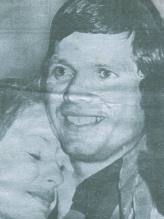 Before
they left Hong Kong, Radio, Press and TV networks from all over the world jammed the
hotel's switchboard trying to get interviews. An urgent caller from Scotland wanted to
know who the Jim Mackay was who scored Australia's winning goal. A German TV station
demanded to know if any of the team were expert boomerang throwers. And so the calls
continued as the Socceroos basked in their well-deserved moment of glory.
Before
they left Hong Kong, Radio, Press and TV networks from all over the world jammed the
hotel's switchboard trying to get interviews. An urgent caller from Scotland wanted to
know who the Jim Mackay was who scored Australia's winning goal. A German TV station
demanded to know if any of the team were expert boomerang throwers. And so the calls
continued as the Socceroos basked in their well-deserved moment of glory.
The Koreans were bitter and disappointed over their
defeat and did not hide their feelings. After the game the Korean players refused to
exchange jerseys with the Australians, the usual practice in top international matches.
The next morning in the Hong Kong press, the Korean officials declared that Australia
should not be allowed to play in the Asian zone as its players are too big and too strong.
Changed days indeed from the attitude
that prevailed in the Korean camp after their performances in Sydney and Seoul. South
Korean newspapers said that Australia clearly deserved its 1-0 win.
They generally agreed that Korea was the weaker and slower side. The Socceroos held the
upper-hand for the better part of the 90 minute showdown, which included defensive tactics
that silenced two of Korea's big guns, forwards Kang Tae Hyun and Kim Jin Wook. Seoul,
with a population of six million, looked like a ghost-town during the game, people staying
home to watch the live television coverage of the match or listen on the radio.
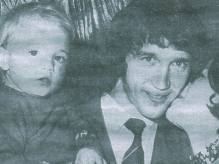 The
whole Australian party had still not fully-accepted the fact that they had qualified for
Soccer's greatest event. Qualifying for the finals also means a bonanza for the players.
The men in this squad will be paid $AUD2,000 each for beating South Korea, bringing their
total winning bonuses for 11 World Cup games this year to $AUD3,000.
The
whole Australian party had still not fully-accepted the fact that they had qualified for
Soccer's greatest event. Qualifying for the finals also means a bonanza for the players.
The men in this squad will be paid $AUD2,000 each for beating South Korea, bringing their
total winning bonuses for 11 World Cup games this year to $AUD3,000.
The 22 players travelling to West Germany can earn, on conservative estimates, about
$AUD10,000 each. And this could soar to $AUD15,000 when fees for endorsements and bonuses
are taken into account. No football team in any code in this country has had the
preparation that Rasic supervised, including several months in training camps since last
March. The players received $120 a week and free meals and accommodation to compensate for
lost-time at work.
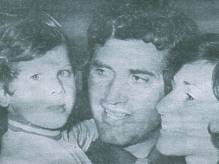 Rasic
said at the airport, "My squad has displayed team spirit, a basic quality some of the
top soccer nations are still striving to achieve." The national coach has made it
clear he wants to keep his squad together in camp. He wants to take a squad of at least 22
to West Germany. And before he selects them, he plans to take a hard look at all the
possible candidates. Sadly, several players in the triumphant squad have no real hope of
going to West Germany. They are slowing down with the passing of each season. Those around
the 30 mark and over will have to make way for younger talent.
Rasic
said at the airport, "My squad has displayed team spirit, a basic quality some of the
top soccer nations are still striving to achieve." The national coach has made it
clear he wants to keep his squad together in camp. He wants to take a squad of at least 22
to West Germany. And before he selects them, he plans to take a hard look at all the
possible candidates. Sadly, several players in the triumphant squad have no real hope of
going to West Germany. They are slowing down with the passing of each season. Those around
the 30 mark and over will have to make way for younger talent.
Rasic is always reluctant to discard his old
faithfuls but he realises new blood must be found. "The days of players like Warren,
Tolson and Watkiss are over, but we will never forget what they had done for Soccer in
this country."
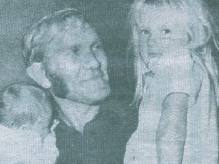 Australia's
international Soccer team will start preparations for the 1974 World Cup early in
February. The opening assignment will be a match in Sydney against top Hungarian side
Ferencvaros Budapest four months before the World Cup kicks off in Frankfurt.
Australia's
international Soccer team will start preparations for the 1974 World Cup early in
February. The opening assignment will be a match in Sydney against top Hungarian side
Ferencvaros Budapest four months before the World Cup kicks off in Frankfurt.
This will be followed by matches in Australia against
other top class clubs or countries. In mid-May, Australia will take off for Europe for a
few friendlies. These games will be used to toughen Australia's part-time professionals
and to help them acclimatise to the northern summer.
|